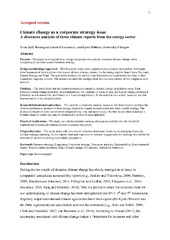Climate change as a corporate strategy issue: A discourse analysis of three climate reports from the energy sector
Peer reviewed, Journal article
Accepted version
Permanent lenke
https://hdl.handle.net/1956/22630Utgivelsesdato
2019Metadata
Vis full innførselSamlinger
Originalversjon
https://doi.org/10.1108/ccij-08-2018-0088Sammendrag
Purpose – The purpose of this paper is to explore how energy companies discursively construct climate change when integrating it into their overall business strategy. Design/methodology/approach – This linguistic study uses a quantitative/qualitative approach to investigate three instances of recent climate disclosure, climate strategy reports, by the energy majors Statoil (now Equinor), Suncor Energy and Total. The qualitative analysis focuses on how keywords and expressions function in their immediate linguistic context. The discussion takes the socio-political and business context of the companies into account. Findings – The paper finds that the reports discursively construct climate change in different ways. Total presents climate change primarily as a responsibility the company is ready to take on; Suncor Energy presents it primarily as a business risk; and Statoil as a business opportunity. In the material as a whole, however, the risk representation is the most prevalent. Research limitations/implications – The material is relatively modest; however, the three reports represent the first comprehensive accounts of how energy players fit climate considerations into their overall strategy. The analysis is based on three search terms (responsibility, risk and opportunity). Further studies should include a broader range of words that may be semantically related to each approach. Practical implications – The study can inform corporate strategy discussions and indicate the rhetorical implications of discourse-related choices in climate disclosure. Originality/value – The study deals with very recent corporate disclosure involving an emerging discourse, climate strategy reporting. As the reports represent responses to investor engagement, the findings should also be relevant for studies involving stakeholder perceptions.
